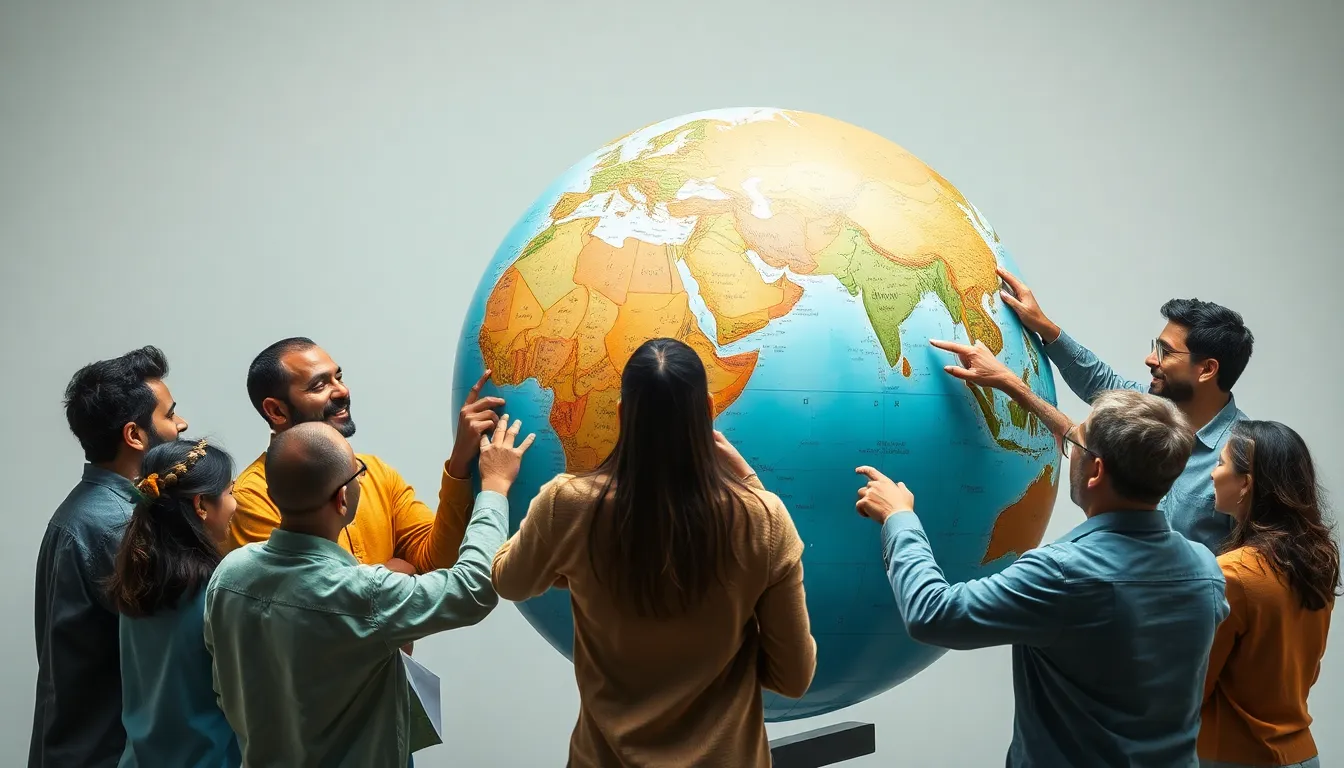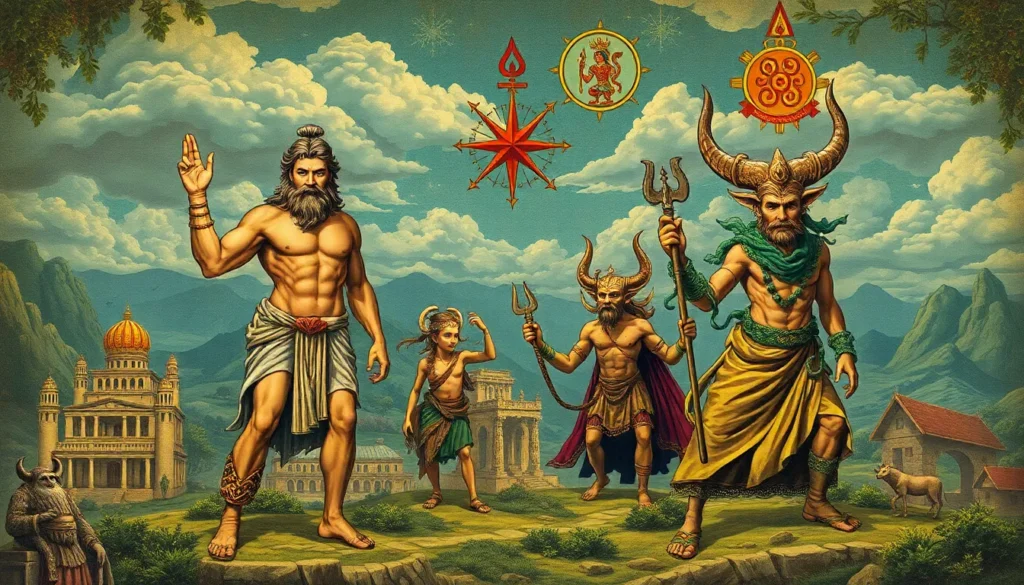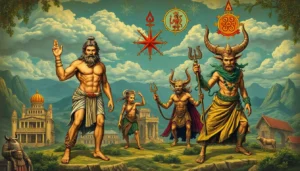Table of Contents
ToggleCultural mythology isn’t just a collection of ancient stories; it’s the vibrant tapestry that weaves together the beliefs, values, and quirks of societies around the globe. From the daring feats of Hercules to the mischievous antics of Loki, these tales shape our understanding of the world and add a splash of color to our everyday lives. Who wouldn’t want to know why a thunder god throws tantrums or why a trickster can outsmart the smartest?
As we dive into the fascinating realm of cultural mythology, prepare to uncover the hidden gems and laugh-out-loud moments that define humanity’s shared imagination. Whether you’re a seasoned mythology buff or a curious newcomer, these stories offer insights that resonate today. Buckle up for a journey that’s equal parts enlightening and entertaining—after all, who says learning can’t be a riot?
Understanding Cultural Mythology
Cultural mythology serves as a lens through which societies express their collective values and beliefs. It encompasses stories that define cultural identities, impart moral lessons, and explain the mysteries of existence.
Definition and Significance
Cultural mythology consists of traditional narratives that embody the values, fears, and hopes of a society. Such myths explain natural phenomena, historical events, or human behaviors. They hold significant influence by shaping social norms and guiding individual conduct. For instance, myths provide frameworks for understanding life events, such as birth and death. Engaging with these stories cultivates a sense of belonging and shared identity among community members. Their role in preserving history and tradition makes cultural mythology an essential part of any society’s fabric.
Historical Context
Historical context anchors cultural mythology in specific times and places. Ancient civilizations utilized myths to interpret their surroundings and develop social order. For instance, the Greeks formulated myths about gods and heroes to explain natural disasters and societal structures. Various cultures, from indigenous tribes to modern societies, have evolutionarily adapted their myths to reflect changing values. This adaptability highlights the dynamic nature of mythology, which evolves alongside cultural shifts. Observing these historical roots allows for a deeper appreciation of how myths continue to resonate within contemporary contexts.
Types of Cultural Mythology

Cultural mythology encompasses various types, each serving unique purposes within society. Exploring these categories reveals how they reflect beliefs and values.
Creation Myths
Creation myths explain the origins of the world and humanity. These narratives often involve gods or supernatural beings creating the universe from chaos. Different cultures share distinct stories; for instance, the Genesis account in the Bible contrasts with the Hindu tale of Brahma. These myths answer fundamental questions about existence and purpose, shaping societal understanding of life and the cosmos.
Hero Myths
Hero myths celebrate the extraordinary deeds of individuals who embody cultural ideals. These narratives feature protagonists overcoming immense challenges, like Hercules or Arjuna. They reflect societal values such as bravery, virtue, and sacrifice. Each culture presents heroes with unique traits, illustrating how local values influence these stories. Hero myths serve as moral guides, inspiring individuals to aspire to greatness.
Divine Myths
Divine myths explore the characteristics of gods and their interactions with humanity. These stories highlight the power and influence of deities over natural and human affairs. For instance, the Greek pantheon showcases gods like Zeus, who govern different aspects of life. These narratives often provide insight into rituals and worship practices. Divine myths also illustrate human weaknesses and the consequences of disobedience, reinforcing moral lessons within society.
Functions of Cultural Mythology
Cultural mythology serves various essential functions within societies. It shapes beliefs and values while fostering connections among individuals.
Explanation of Natural Phenomena
Myths often provide explanations for natural events. For instance, thunder could symbolize the anger of a god, while seasonal changes might reflect divine actions. Societies use these narratives to make sense of unpredictable phenomena, creating a framework for understanding their environment. Thus, ancient cultures found meaning in myths as they navigated the mysteries of life.
Morality and Ethics
Cultural myths serve as moral guides. Hero myths frequently illustrate virtues such as courage, honesty, and loyalty. The stories impart lessons on ethical behavior, demonstrating consequences for both good and bad actions. By highlighting characters who reflect societal ideals, myths encourage individuals to adhere to shared moral standards and foster accountability within their communities.
Social Cohesion
Mythology strengthens social bonds among community members. Shared stories create a common identity, which unites individuals through collective beliefs. By participating in mythological narratives, people reinforce their heritage, traditions, and values, enhancing group solidarity. Consequently, a sense of belonging emerges, offering individuals a reliable support system within their cultural context.
Influence of Cultural Mythology
Cultural mythology profoundly influences various aspects of society, shaping literature, art, traditions, and customs.
Impact on Literature and Art
Cultural mythology inspires countless works in literature and art. Artists draw upon mythological themes to create intricate paintings, sculptures, and performances. Writers often weave mythological motifs into narratives, enriching their characters and plots. For instance, James Joyce’s “Ulysses” reinterprets Homer’s epic in a modern context. Additionally, myths provide archetypal characters and stories that resonate across cultures, allowing for universal themes of heroism, love, and conflict. The presence of mythical elements transforms ordinary stories into profound commentary on human experience. Consequently, cultural mythology continues to captivate audiences, fueling creativity and dialogue.
Shaping Traditions and Customs
Cultural mythology plays a crucial role in forming traditions and customs within societies. Rituals often derive from mythological stories, providing context for practices around life events, such as births, marriages, and funerals. Celebrations like Diwali and Easter are steeped in myth, enriching their meaning for participants. In addition, myths help preserve cultural heritage by passing down values and lessons through generations. Celebrating shared myths fosters community bonds and a sense of belonging. Altogether, these traditions reflect the enduring significance of cultural mythology in everyday life.
Conclusion
Cultural mythology remains a vital component of human experience. It connects individuals to their heritage while providing insight into shared values and beliefs. These narratives not only entertain but also educate, shaping moral frameworks and community identities.
As societies evolve, so do their myths, adapting to reflect contemporary issues and values. This fluidity ensures that cultural mythology continues to resonate, enriching literature, art, and traditions. By exploring these timeless stories, individuals can gain a deeper understanding of themselves and the world around them, fostering a sense of belonging in an ever-changing landscape.



